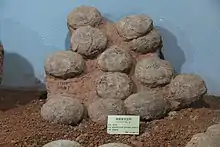Faveoloolithidae
Faveoloolithidae is an oofamily of dinosaur eggs. It contains Faveoloolithus, Hemifaveoloolithus, Parafaveoloolithus, and probably Sphaerovum.[1] However, unlike the other Faveoloolthids, Sphaerovum has compactituberculate ornamentation more similar to megaloolithids.[2] Like Dictyoolithidae, the membrane and the calcareous part of the eggshell formed simultaneously instead of forming the membrane before the calcareous like modern birds.[3]
| Faveoloolithidae | |
|---|---|
 | |
| Faveoloolithus sp. eggs, Henan Geological Museum | |
| Egg fossil classification | |
| Basic shell type: | †Dinosauroid-spherulitic |
| Oofamily: | †Faveoloolithidae |
| Oogenera | |
See also
References
- Casadío, Silvio; Manera, Teresa; Parras, Ana; Montalvo, Claudia L. (2014-02-20). "Huevos de dinosaurios (Faveoloolithidae) del Cretácico Superior de la cuenca del Colorado, provincia de La Pampa, Argentina" [Dinosaur eggs (Faveloolithidae) from the Upper Cretaceous of the Colorado Basin, La Pampa Province, Argentina]. Ameghiniana (in Spanish). 39 (3): 285–293.
- Carpenter, Kenneth (1999). Eggs, Nests, and Baby Dinosaurs: A Look at Dinosaur Reproduction. Bloomington, Indiana: Indiana University Press. p. 144. ISBN 978-0-253-33497-8. OCLC 488879306.
- Z.-K. Zhao. (1994) "Dinosaur eggs in China:On the structure and evolution of eggshells." In K. Carpenter, K. F. Hirsch, and J. R. Horner (eds.), Dinosaur Eggs and Babies, Cambridge University Press, Cambridge. Cambridge. pp. 184–203.
This article is issued from Wikipedia. The text is licensed under Creative Commons - Attribution - Sharealike. Additional terms may apply for the media files.